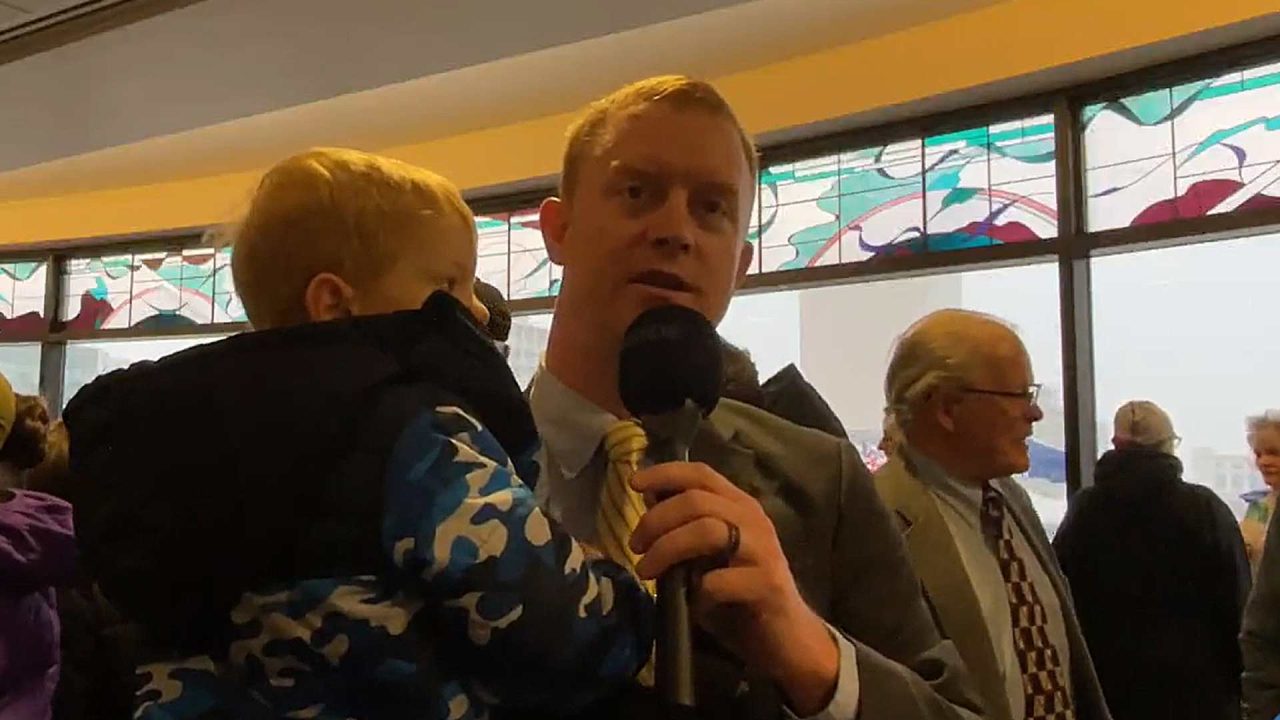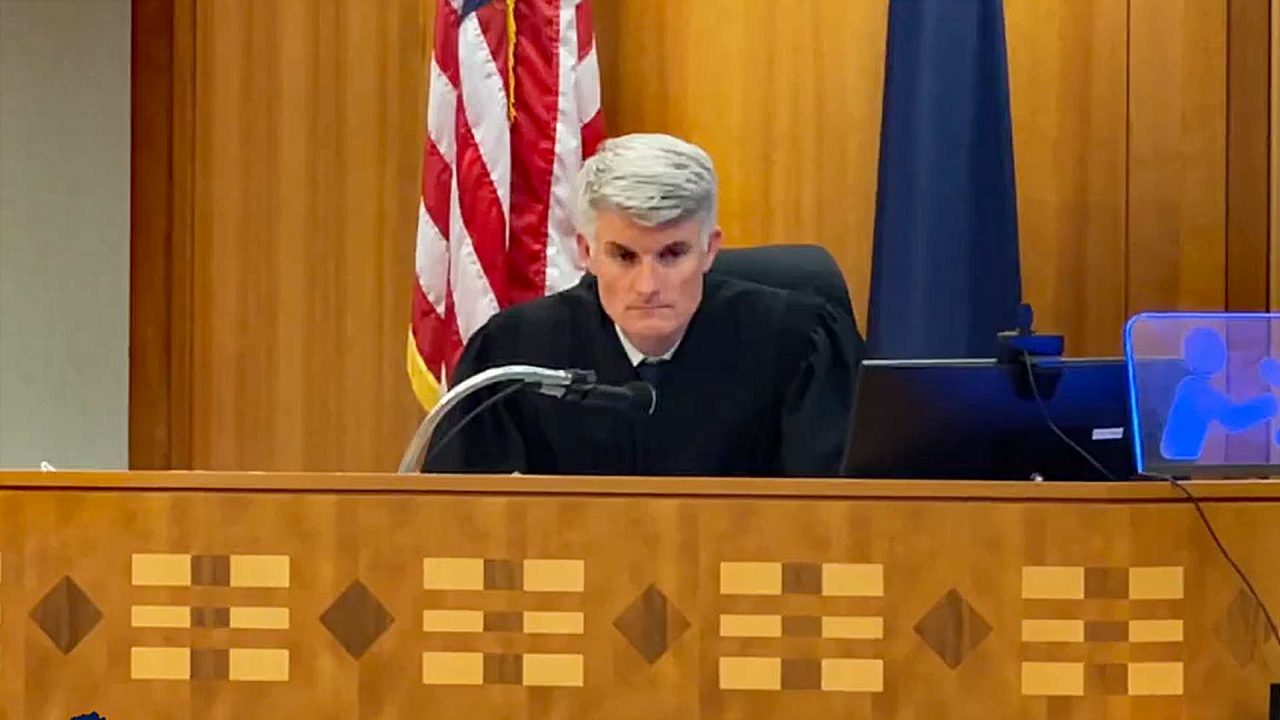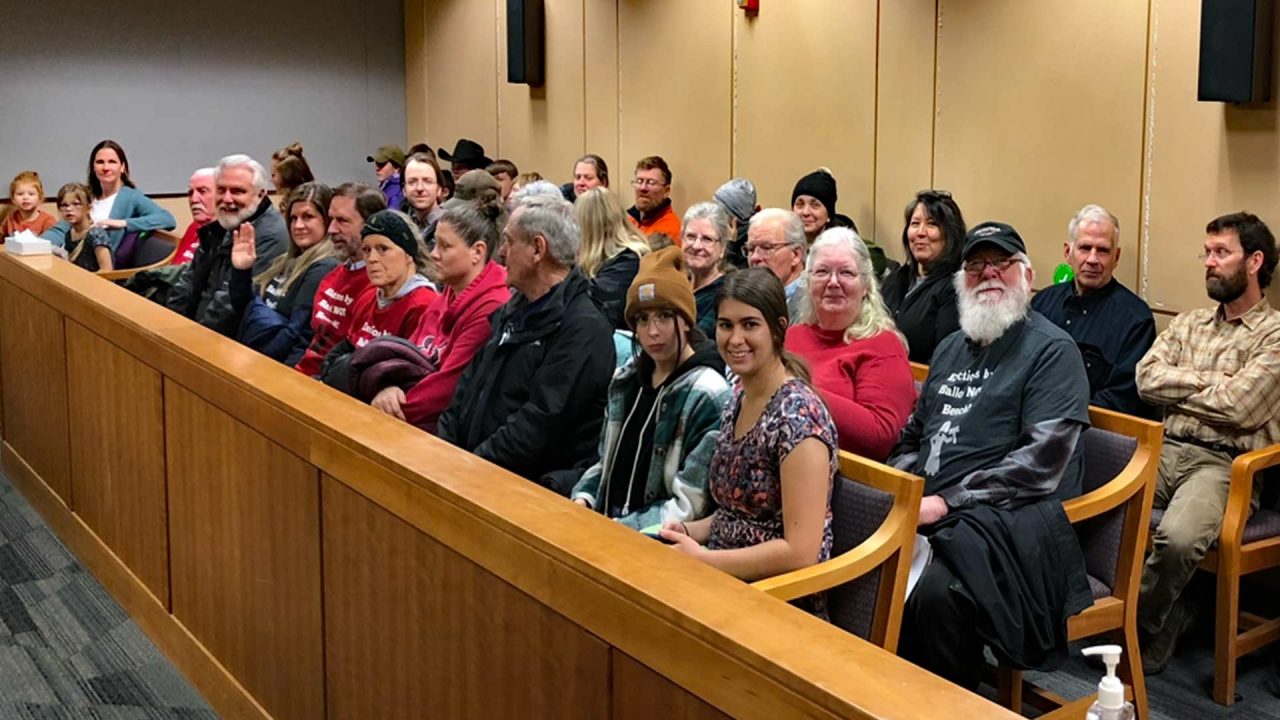
Roughly 50 people packed a standing room only Anchorage courtroom on Oct. 25 in a show of support for Wasilla State Rep. David Eastman. Another 10 people stood outside during a preliminary hearing in a case that seeks to disqualify the three-term state legislator from holding public office.

The pro-Eastman crowd wore red t-shirts emblazoned with, “Elections by Ballot NOT by Bench!” This was in reference to the fact that the plaintiffs in the case want a judge to unilaterally disqualify Eastman from holding office, regardless of whether voters choose to re-elect him in November for a fourth consecutive term as their elected state representative.
The case centers on a claim by former Mat-Su Assemblyman Randall Kowalke alleging that Eastman’s association with the national Oath Keepers organization violates the Alaska Constitution’s loyalty clause, which prohibits people from holding public office if they belong to a group that “advocates the overthrow by force or violence of the United States or of the State.”
Kowalke’s assertion that Oath Keepers is an insurrectionist group hinges on the fact that a tiny percentage of its members were charged – but not convicted – in the events that unfolded on Jan. 6, 2021, at the U.S. Capitol. Two members of the 38,000-member national organization pleaded guilty of seditious conspiracy to try and stop the certification of the presidential election, but Oath Keepers’ bylaws in no wise call for the overthrow of the government, nor has Eastman.
Eastman’s association with Oath Keepers is limited to a donation he sent the group in 2010, which resulted in a “Lifetime membership” certificate sent to him via mail. Eastman maintains he has never attended an Oath Keepers’ rally or event, and it’s not clear he has any active role in the group.
Earlier this summer, Kowalke asked the Division of Elections to remove Eastman from the ballot. The agency declined, saying Eastman was a candidate in good standing, regardless of whether he is an Oath Keepers member.
Anchorage Superior Court Judge Jack McKenna, who is presiding over the case, has ruled that Eastman can remain on the Nov. 8 ballot, but if voters elect him – as expected – the Division of Elections is not allowed to certify the results until after the trial’s conclusion.

Last month, Judge McKenna said that if Eastman loses the case, the Division of Elections could give his House District Seat 27 to the runner up.
Eastman – a state legislator since 2016 – remains popular among his Mat-Su constituents, as was evidenced at the packed courtroom on Oct. 25. During the recent primary election, he easily outpaced his two challengers. Eastman’s constituents, however, are concerned that their representative must overcome what they view as a politically motivated trial, perfectly timed to cast a shadow over his candidacy.
At the Oct. 25 hearing, plaintiffs said their case against Eastman would take about 8-10 hours to present, but they then raised an objection to the fact that Eastman has filed a witness list with 45 people on it for his defense.
Kowalke’s attorney claimed the long list was an attempt to “extend the trial long enough that it would be hard for the court to grant effective relief,” and asked the judge to limit the time each party has to call witnesses.
Eastman’s attorney – former U.S. Senate candidate Joe Miller – countered, saying he needs sufficient time to establish the facts of the case. In particular he wants to address the question of whether Oath Keepers truly advocates for the violent overthrow of the government. If Miller can show that it does not, the claim that Eastman is part of an insurrectionist group will likely collapse.
“It’s really the core question for the court,” Miller said via teleconference at the Oct. 25 hearing.
Miller added that he aims to address what actually unfolded on January 6 at the U.S. Capitol and whether Oath Keepers ever officially advocated for violence that day.
“Or on the other hand did the organization actually act to support law enforcement in many respects,” Miller said.
Miller noted that he also wants to look at the “overarching question” of whether “outside of Jan. 6, does this organization advocate in a way that would put Rep. Eastman in violation of the [Alaska] loyalty clause.” Finally, Miller said there is a key question about to what extent Eastman is an active member of the group at all.
Miller said wants the trial to resolve quickly, but he needs about a week bring witnesses, including a few experts.
Judge McKenna said he would grant additional time, and set the trial to run Dec. 12-20 with full eight-hour days – 8:30 a.m. to 4:30 p.m.
ALASKA WATCHMAN DIRECT TO YOUR INBOX
There is still a motion to change the location of the trial to the Mat-Su where Eastman lives. This request has not yet been decided by the judge.
Another pretrial conference to work out final details is set for Nov. 17 – nine days after the midterm election.
After the Oct. 25 hearing, Eastman visited with his supporters in a large gathering outside the courtroom. He also spoke on camera with Politadick, a Mat-Su based political blog.
“It’s unfortunate that this is all taking place during an election campaign, but there’s a lot more work to be done just to get the facts before the court between now and the election,” Eastman said. “Pretty important case, I think.”
Eastman said the case is a “turning point where those who might like to say they believe in elections and trusting the will of the voters, are arguing in court the exact opposite. They are arguing the voters should not be trusted to make some decisions.”
In a memo sent to Judge McKenna last month, Eastman said the case is likely to have an impact on his political campaign in the lead up to the election.
On Oct. 25, Eastman said he doesn’t fault the judge for presiding over such a case, but said there is “a lot of danger and a lot of damage being done, just by virtue of the case going forward right now.”








22 Comments
I wrote some of this in another post about Kowalke. Though I must add that I am still wondering how he has standing to bring this frivolous case to begin with? Maybe what is seemingly so easy for him is surely would be so for another? A cursory search brought to my attention the many legal involvements and beefs Kowalke seems to have had in his past.
On September 16th, 2019 Kowalke wrote, “Let the doxxing begin” in reference to a political beef he had with Gov. Dunleavy. Maybe someone would like to take up the torch and give him what he is asking for because Kowalke certainly seems to be asking. Goose and gander, ect., ect.
This would set a dangerous precedence if Kowalke wins. If I’m a member of a gun club, faith-based organization or a dachshund rescue group and a couple members do something weird, than I’m automatically disqualified from running for political office?
I could understand a legit argument that he didn’t realize who he was donating to or what the group represented.
But this group is a known hate group and anti-govt terrorist group with ties to white supremacist and nazi groups. Some other countries actually ban entry by its members altogether because of their terrorist rhetoric.
Just put him under oath and ask him if he condemns the Jan 6 insurrection, and if he disavows his membership to this terror group. As the article pointed out, multiple people have plead guilty to seditious conspiracy and implicate the groups leadership for organizing the attack on the American Government. They stashed weapons and planned an all out military operation to kill people and take over the govt. Joe Miller is a crackpot himself. He has no hope of convincing the courts that a reasonable person wouldnt understand this group is bad news. The Jan 6 commission compiled reams of damning social media posts, videos, texts, and phone logs proving these guys organized to attack the govt. So like I said, put him under oath and ask him if he understands Biden is the legitimate President and if he disavows any groups or persons that seek to overthrow the government, and if he will resign immediately if he is caught lying. Problem solved.
The actual insurrection came straight out of Pelosi’s office.
Oh don’t say that. It demonstrates your unwillingness to understand and accept proven facts.
So are you going to hold equally culpable the politicians who organized bail funds for ANTIFA during their riots which resulted in ANTIFA invading and over taking sections of various cities, many deaths and the loss of jobs, businesses and income and the total destruction of sections of several cities? How about politicians who advocate for the mass murder of entire groups of American citizens? There are recordings of several politicians stating that millions of Americans who do not share their political beliefs should all be killed. Do you believe those politicians should be removed from office and never allowed to hold public office again? I doubt that you do. Also just what countries have banned Oath Keepers? If there are in fact any such countries I suspect it’s countries run by people who don’t want to follow their countries laws and who want to make up the rules to suit themselves as they go. I don’t consider Oath Keepers a terrorist group. They are military, police, and others who have taken an oath to up hold the American Constitution and to Protect and Serve the people (even you). I don’t believe the oaths they took as public servants which they have promised to continue upholding makes them NAZIs. I remember when the people who voted for Ron Paul and all active duty war vets were put on terrorist watch lists until people threw fits and had them removed. I think it’s pretty un-American and a lot more dangerous than anything that was done on Jan.6 or even during the ANTIFA riots when certain groups want millions of people imprisoned or even killed due to political differences. That is what you should be worried about- not about a group who promises to serve and protect and uphold the law.
Oath Keepers say they will defend the the constitution but their actions are the opposite.
Clark are you sure your not talking about Anyifa or BLM?
I’m glad to see that 50-60 people showed up. I was unable to go, but will keep Rep. Eastman in my prayers.
Rhodes sent a message to an Oath Keepers chat two days after the presidential election to reject the election results. “We aren’t getting through this without a civil war,” Rhodes allegedly wrote. “Too late for that. Prepare your mind, body, spirit.”
Rhodes allegedly posted on a group chat that if Biden were to take office, “it will be a bloody and desperate fight. We are going to have a fight. That can’t be avoided.”
Rhodes=traitor=Eastman
Terry Stires=Soros paid schill/troll
cry more snowflake
Yup, troll for sure.
As for civil war, we are already in one. It is already a desperate fight, and I pray that it will not become a bloody one, but I fear it will if they keep tampering with elections, encouraging hordes of invaders across the southern border, and forcing wokeness upon our children.
Pray for Eastman; pray imprecatorially against Kowalke and his minions.
Put the box wine away Terry.
Eastman believes Trump won the election. Eastman= fool.
Yet Eastman NEVER attended an Oath Keeper rally nor was Eastman EVER in contact with Rhodes. “Guilt by Association” is mob-rule, unconstitutional, and convenient for low hanging fruit grabbers to sling stones at glass houses yet forget they live in one. Rhodes=MIA=Terry Stires is a low hanging fruit grabber. Try harder.
The FBI Report on J6 concluded that there was no evidence of any organized effort to overthrow the gov
Thank you for pointing that out. It’s amazing to me how many people try to forget that.
It’s also amazing to me how many people don’t even know what the Oath Keepers group actually is. They are people who have taken an oath given to them by the United States government as part of their requirement for employment in various capacities such as police or military or first responder jobs. They promise to keep their oaths to serve and protect and uphold the laws and constitution, hence the name Oath Keepers. They keep their oath. It is not a NAZI group and not one to be feared or hated.
So conservatives condemn the FBI for lawfully investigating Trump’s theft of government documents but now believe the FBI’s incomplete report. Far right conservatives are hypocrites.
Then why haven’t they investigated, (raided) Obama or Clinton as they also had several thousand pages of classified documents in their possession after they left office. Surely you are in favor of equal treatment for everyone.
If Eastman can be “banned”, a modern equivalent of Tar and feathers, to the Siberian Gulag with you! If US Founding Fathers we subjected to these ‘witch hunt’ tactics, there would have never been a USA.: the longest representative republic, ever on earth. We are assaulted on all fronts, and being stabbed in our backs as well… by, ? well by those who never keep their oaths. Unless and until we prosecute every single person involved in murders, maiming, vandalism, arson, looting, etc. (domestic terrorism, each and all). The US is not a nation of laws. Except for the totalitarians. grandma